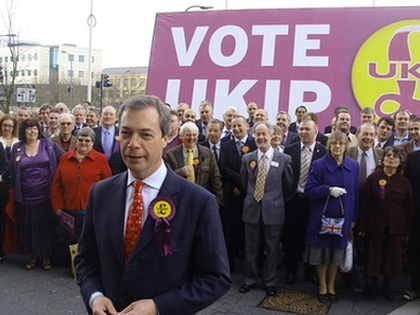In an article for the Daily Telegraph, columnist Dan Hodges reveals that UKIP have become identified as the new bastards of British politics. They might have spooked the Westminster village with their populist rhetoric, but the British public knows a scoundrel when it sees one, and wants nothing to do with them.
The basis of Hodges’ claim is a recent ComRes poll that asked people which party they would describe as ‘nasty’. UKIP pipped the Conservatives by 2 percent, with the relatively benign Labour Party a distant third. Hodges attributes this shocking revelation to UKIP’s cruelty and zealotry, which he describes as distinctly un-British.
As evidence of their viciousness, Hodges cites UKIP’s criticism of the Red Cross (“the real people’s army”) for refusing money raised by DJ Mike Read’s now-withdrawn charity record. Apparently its officials and supporters were “queueing up to attack the Red Cross. They had a Labour supporter on the board. They were funded by the EU. It was all a great conspiracy.”
Dan Hodges is a good journalist and an admirable champion of Israel, but he’s a New Labour man through and through. He may have no time for the current Labour Party’s pre-Thatcherite nostalgia, but he wants to keep politics and politicians at the centre of our lives, and appears to believe that Westminster should belong to media-savvy shysters, rather than enthusiastic amateurs who want to open people’s eyes to a life outside the bureaucratic big top. It’s doubtful, then, that he speaks for every right-minded person in the land.
UKIP is a party that provokes strong feelings among its opponents. Tories fear that it will erode their support and Labourites see it as a greater threat to the progressive crusade than the craven, on-message Conservative Party. It should come as no surprise that both sides are united in resenting UKIP, and are keen to bad-mouth it whenever possible. More to the point, only 32 percent of people polled described UKIP as the nastiest political party, meaning that 68 percent thought otherwise – hardly anything for Nigel Farage to lose sleep over.
A cynic might wonder whether the other side in the UKIP charity record debacle is really the blameless paragon described by Dan Hodges. Why, for instance, did the supposedly non-political Red Cross appoint Sir Charles Allen as its chairman when he was also executive chairman of the Labour Party? And why, for that matter, does it accept government funding if taking money from politicians is against its principles?
But to ask such questions of a beloved aid agency is bad form. UKIP should have simply accepted that no matter how much organisations like the Red Cross fill their ranks with Labour placemen, pursue a left-wing agenda, and parrot progressive pieties, they remain models of virtue and neutrality, that only a zealot would criticise.
These are the assumptions the Left counts on people making, because they facilitate its agenda. We are supposed to take left-wing activism for impartial pragmatism, and accept that it is perfectly compatible with the founding principles of our great institutions. By trading on the heritage and good intentions of these institutions, the Left is able to describe opposition to its ambitions as un-British – as if acceptance of progressivism is the hallmark of decency and tolerance.
Britishness, as once understood, was about resilience, independence, charity, and a sense of irony and fair play. These are qualities unknown to the modern Left, which prefers a philosophy of victimhood, dependency, cronyism, statism and po-faced touchiness. For UKIP to challenge these dismal values doesn’t make them nasty, zealous or un-British; it simply makes them conservative.

COMMENTS
Please let us know if you're having issues with commenting.